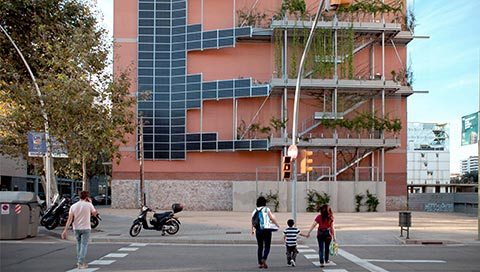

Pla Clima
Why are we promoting the Pla Clima?
Climate change is here, and we are already feeling its effects in the form of droughts and heat waves, which have a direct impact on our health. Cities play a key role in finding solutions to mitigate its consequences and adapting to become more resilient, sustainable and healthy.
Barcelona has historically been a pioneer in its struggle to combat climate change with innovative policies like the Citizen Commitment for a More Sustainable Barcelona, the Climate Emergency Declaration and the adaptation of the 2030 Agenda.
Now we are taking yet another step and presenting the Government Measure for the Pla Clima to place climate policies at the core of municipal action and boost our commitment to the planet. The Plan includes specific, rigorous and effective lines of action. We have the scientific knowledge and technological and social innovation needed to address both the causes and the consequences of climate change.




€1.8 billion to implement specific measures in support of decarbonisation and the city’s adaptation to climate change.
What do we do?
Mitigation (decarbonising)
- Structural change in power generation and consumption
- Low-emission mobility model
- Renovated and efficient building stock
- Carbon-neutral municipal action
Adaptation
- Reducing heat vulnerability
- Prevention measures against the growing risk of wildfires
- Guaranteeing adequate water resources
- Reducing the risk of flooding due to poor drainage
- Protecting the coastline against storm surges and rising sea levels
- Increasing greenery-related social and environmental services
Actions
The Government Measure for the Climate Plan is a rigorous, well-grounded roadmap that aims to mitigate and adapt to the effects of climate change in Barcelona. It has a budget of over €1.8 billion to accelerate the climate transition, as well as six programmes with specific actions:

Mobility Plan
- Improving public transport (L8, L9, Rodalies trains, Tram)
- Electrifying the fleets and spreading the Endolla Barcelona charger network
- Transforming public space to foster sustainable mobility on foot, by bicycle or on public transport
Energy Transition Plan
- Multiplying the amount of renewable and local energy generated by five
- Expanding the heating and cooling networks in 22@ and Zona Franca, and opening a new area in La Sagrera
- Stepping up the energy renovation of buildings
Heat Plan
- Expanding the climate shelter network and adding water play areas in public spaces
- School Climate Plan and Residencies Climate Plan to work towards equipping these spaces with air conditioning
- Shade Plan
- Improving the response to heat emergencies

Neighbourhood Climate Plan
- Including the climate perspective as a working area in the Neighbourhood Plan
- Defining the health and climate change strategy
- Implementing the Local and Interior Spaces Programme (PEPI)

Resilience Plan
- Adapting to constant drought and rolling out an Alternative Water Resources Plan
- Preparing the coastline
- Lowering the risk of floods and forest fires
- Enlarging and improving green areas
‘Let’s Change for the Climate’ Plan
- Setting up a Climate Advisory Council
- Strengthening the More Sustainable Barcelona Network and fostering a results-orientated approach to the city's challenges
- Announcing more calls for climate subsidies
- Holding the 2nd Citizen Climate Assembly
- Developing the Carbon Neutral City Council Programme
- See the complete Government Measure for the Climate Plan here.

